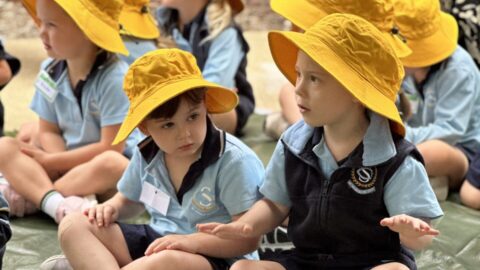From the Principal – You Belong with Me

This week has returned to normalcy after the whirlwind excitement of last week and the weekend. Undoubtedly, I’m referring to the Taylor Swift phenomenon that swept through Melbourne. Unless you’ve been living on the moon, and even there, I suspect her influence would be apparent, you’ve likely been caught up in Taylor Swift mania, whether you’re a fan or not.
While I was aware of Taylor Swift and her dedicated fanbase, known as Swifties, I must confess to being largely oblivious to her music. This led me to ponder: what is it about Taylor Swift that inspires such fervent devotion from her fans?
“We’re happy, free, confused, and lonely at the same time. It’s miserable and magical.”
The lyrics to Taylor Swift’s hit song, “22,” ring true for any teenager and indeed, older people, trying to navigate the newfound freedom of moving towards adulthood and a life away from parents, time spent at university, socialising, learning new responsibilities, and wondering, “Where do I belong?” Fans say, “she gets it, she gets me, and these people here they all get me.” This sense of belonging and community is what fans experience. Swifties see their life experiences mirrored in her songs and performances. They feel understood and validated, like they aren’t alone in the confusion, their loneliness, or their happiness.
Writing in Psychology Today, Tasha Seiter MS, PhD, says research tells us that feeling understood and validated feels good. She says that on days when people feel more understood by others, they experience fewer physical symptoms and enjoy great life satisfaction. Seiter adds that studies “reveal that the experience of being validated activates the reward and social connection areas of the brain (the ventral striatum and middle insula), whereas the experience of feeling misunderstood turned-on areas of the brain associated with negative mood states (i.e., the anterior insula). Researchers also found that feeling validated created feelings of social connection, while feeling misunderstood led to feelings of disconnection.
Swift fans connect through the same feelings of being understood and validated. There is something very human about uniting around a shared experience and belief system. Think of having dinner together, think of attending church, think of a club, think of a school and think of going to see Taylor Swift with nearly 100,000 other people. It feels good to be a part of something bigger than ourselves, a sense of common humanity and of community.
Of vital importance to teachers at St Catherine’s is that our students feel connected. Being ‘connected’ is a term widely used today. But we need to understand what this really means for girls and adolescents in order to support their holistic, healthy wellbeing and development. What do we really mean when we talk about connections? Dr Tori Cordiano, consulting psychologist and director of research at Laurel Schools Centre for Research on Girls in Shaker Heights, Ohio, USA, aptly describes this as the importance and power of relationships, not only with parents and caregivers, but with other adults in a girl’s life such as teachers, coaches, mentors and tutors.
Dr Cordiano says, from an adolescent girl’s own perspective, it is important that she ‘feels that she can be fully and authentically herself’, knowing that she can be confident, but that she can also ‘be vulnerable, she can be uncertain, and she can know that she can bring that to the relationship without fear of judgement or reproach and she is accepted for who she truly is.’ As parents and adults seek to support the girls and young women in their lives, many feel overburdened by the negative media and events facing the world. A brief perusal of news and social media outlets reveals the extent to which parents are warned of the many threats that could affect their child. This can create a sense of fear and trepidation as families seek to support girls’ healthy development. How can we empower confident, holistically healthy young women in a world that often appears to be spiralling with negativity, horrific crises, loss and trauma?
Dr Judith Locke, a clinical psychologist and researcher from the Queensland University of Technology says sometimes supporting girls’ connections means stepping back. Having a positive, loving, healthy relationship is undoubtedly important. Yet helping girls learn how to navigate disappointment while building resilience and coping skills is just as essential as building a positive relationship with parents. Developing these connections isn’t easy, but it allows families and teachers to support girls’ holistic and healthy wellbeing during times that are often clouded with such tumultuous change around the world.
The role of schools and for us at St Catherine’s is to assist girls feeling they belong. Science tells us that this sense of having “a tribe” is one of the most important aspects to a happy life. For example, one study of 120,000 respondents found that closeness to one’s community was a strong predictor of personal happiness. Other studies have found that loneliness is as bad for your health as smoking 15 cigarettes a day and worse for your health than obesity, while a sense of belonging reduces risk for depression and a range of other negative health issues.
Swifties were having many of these needs met as they gathered at the MCG last weekend and sang along to her songs with thousands of friends and strangers such as one of her first hits, “You Belong with Me”, and singing with everyone else in the stadium
“If you could see that I’m the one
Who understands you
Been here all along
So, why can’t you see?
You belong with me
You belong with me”
I suspect that when our students come to St Catherine’s each day, the girls know that we have been here all along, and they belong and feel connected.


